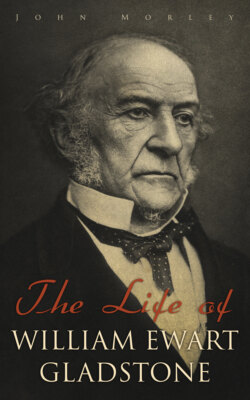Читать книгу The Life of William Ewart Gladstone - John Morley - Страница 54
На сайте Литреса книга снята с продажи.
VIII
MINOR MORALS
ОглавлениеIn this period of his life, with the battle of the world still to come, Mr. Gladstone to whose grave temperament everything, little or great, was matter of deliberate reflection, of duty and scruple, took early note of minor morals as well as major. Characteristically he found some fault with a sermon of Dr. Wordsworth's upon Saint Barnabas, for
hardly pushing the argument for the connection of good manners with Christianity to the full extent of which it is fairly capable. The whole system of legitimate courtesy, politeness, and refinement is surely nothing less than one of the genuine though minor and often unacknowledged results of the gospel scheme. All the great moral qualities or graces, which in their large sphere determine the formation and habits of the Christian soul as before God, do also on a smaller scale apply to the very same principles in the common intercourse of life, and pervade its innumerable and separately inappreciable particulars; and the result of this application is that good breeding which distinguishes Christian civilisation. (March 31, 1844.)
It is not for us to discuss whether the breeding of Plato or Cicero or the Arabs of Cordova was better or worse than the breeding of the eastern bishops at Nicæa or Ephesus. Good manners, we may be sure, hardly have a single master-key, unless it be simplicity, or freedom from the curse of affectation. What is certain is that nobody of his time was a finer example of high good manners and genuine courtesy than Mr. Gladstone himself. He has left a little sheaf of random jottings which, without being subtle or recondite, show how he looked on this side of human things. Here is an example or two:—
There are a class of passages in Mr. Wilberforce's Journals, e.g., some of those recording his successful speeches, which might in many men be set down to vanity, but in him are more fairly I should think ascribable to a singlemindedness which did not inflate. Surely with most men it is the safest rule, to make scanty records of success achieved, and yet more rarely to notice praise, which should pass us like the breeze, enjoyed but not arrested. There must indeed be some sign, a stone as it were set up, to remind us that such and such were occasions for thankfulness; but should not the memorials be restricted wholly and expressly for this purpose? For the fumes of praise are rapidly and fearfully intoxicating; it comes like a spark to the tow if once we give it, as it were, admission within us. (1838.)
There are those to whom vanity brings more of pain than of pleasure; there are also those whom it oftener keeps in the background, than thrusts forward. The same man who to-day volunteers for that which he is not called upon to do, may to-morrow flinch from his obvious duty from one and the same cause,—vanity, or regard to the appearance he is to make, for its own sake, and perhaps that vanity which shrinks is a more subtle and far-sighted, a more ethereal, a more profound vanity than that which presumes. (1842.)
A question of immense importance meets us in ethical inquiries, as follows: is there a sense in which it is needful, right, and praiseworthy, that man should be much habituated to look back upon himself and keep his eye upon himself; a self-regard, and even a self-respect, which are compatible with the self-renunciation and self-distrust which belong to Christianity? In the observance of a single distinction we shall find, perhaps, a secure and sufficient answer. We are to respect our responsibilities, not ourselves. We are to respect the duties of which we are capable, but not our capabilities simply considered. There is to be no complacent self-contemplation, beruminating upon self. When self is viewed, it must always be in the most intimate connection with its purposes. How well were it if persons would be more careful, or rather, more conscientious, in paying compliments. How often do we delude another, in subject matter small or great, into the belief that he has done well what we know he has done ill, either by silence, or by so giving him praise on a particular point as to imply approbation of the whole. Now it is undoubtedly difficult to observe politeness in all cases compatibly with truth; and politeness though a minor duty is a duty still. (1838.)
If truth permits you to praise, but binds you to praise with a qualification, observe how much more acceptably you will speak, if you put the qualification first, than if you postpone it. For example: 'this is a good likeness; but it is a hard painting,' is surely much less pleasing, than 'this is a hard painting; but it is a good likeness.' The qualification is generally taken to be more genuinely the sentiment of the speaker's mind, than the main proposition; and it carries ostensible honesty and manliness to propose first what is the less acceptable. (1835-6.)
